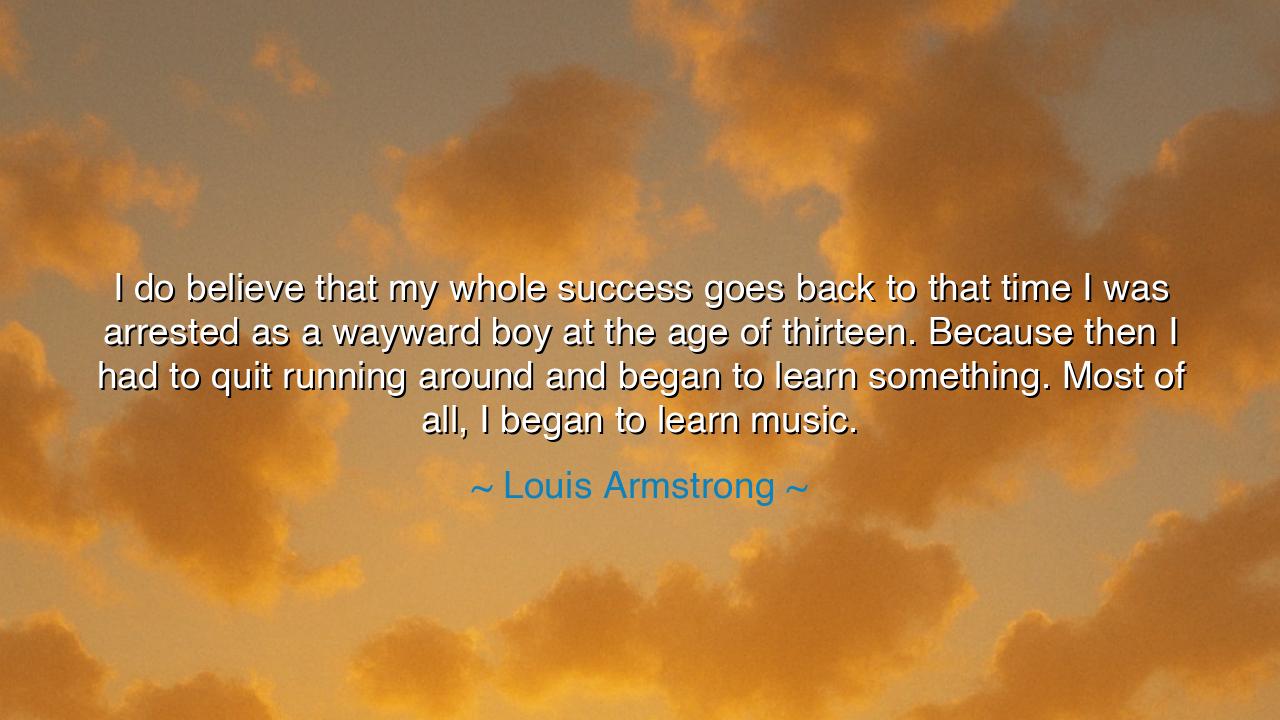
I do believe that my whole success goes back to that time I was
I do believe that my whole success goes back to that time I was arrested as a wayward boy at the age of thirteen. Because then I had to quit running around and began to learn something. Most of all, I began to learn music.






In the journey of life, there are moments when adversity becomes the catalyst for transformation. Louis Armstrong, one of the greatest musicians to ever live, encapsulates this profound truth when he says, “I do believe that my whole success goes back to that time I was arrested as a wayward boy at the age of thirteen. Because then I had to quit running around and began to learn something. Most of all, I began to learn music.” These words, though humble in their simplicity, speak to the power of redemption, the ability of life’s trials to push us toward our higher calling, if only we are willing to learn from them. Armstrong's reflection is not just about the turning point in his own life; it is a universal lesson about how struggle can lead to profound growth and self-discovery.
What does it mean that Armstrong’s success began with his arrest, his time as a wayward boy? In the ancient world, the concept of the wayward child was not uncommon. The Greeks, for instance, spoke of youth as a time of recklessness, a stage in life where one’s impulses led one astray, yet also where one’s character was formed through the lessons of such waywardness. Armstrong's arrest at thirteen was a moment of reckoning, a stop on his path that forced him to slow down and take notice of the world around him. In his moment of struggle, he was presented with the opportunity to change, to choose a new path, and to begin the process of learning—learning not just about music, but about discipline, focus, and purpose.
This transformation is not unlike the story of Odysseus, the legendary Greek hero who wandered the seas for many years, lost in his own waywardness, until the gods finally guided him back home. Much like Armstrong, Odysseus faced challenges that tested his character and resolve, and it was only through suffering and reflection that he was able to return to a place of clarity and purpose. His struggles were not meaningless—they were the forge in which his wisdom was tempered, and it was only after enduring great hardship that he could achieve his ultimate success. Armstrong, too, found his path after a moment of struggle, where he was forced to pause and reflect, and through this reflection, he discovered the transformative power of music.
In a similar vein, Benjamin Franklin, the great American polymath, was often wayward in his youth, reckless in his habits and pursuits, until he was guided by his love of learning. Franklin’s youth was marked by poor decisions, but through his reflection and commitment to self-improvement, he became one of the most influential figures in history. Like Armstrong, Franklin understood that a life of purpose and success requires us to sometimes be stopped in our tracks, to learn from our mistakes, and to embrace new paths that lead us toward our greatest potential. Both men, through their struggles, found deeper meaning in their work and life, demonstrating that great achievements often arise from the most unlikely of circumstances.
Armstrong’s story teaches us that success is not always a straight path. The world often tests us, presenting obstacles that seem insurmountable. But within each struggle lies an opportunity to transform. His story also teaches us about the power of discipline—the discipline to change direction, to stop running from one place to another, and instead to focus on something that requires our time and dedication. Armstrong’s focus on music after his arrest was not just about learning to play an instrument, but about learning the value of persistence and dedication to a craft. It was his decision to embrace music, rather than give in to his youthful impulses, that allowed him to rise above his past and become the legend we remember today.
The lesson here is clear: struggle and mistakes do not define us—they refine us. Life’s trials, though painful in the moment, are often the turning points that guide us toward our true purpose. Just as Armstrong was able to transform his life through music, so too can we find meaning in the challenges we face. The key is to learn from those moments, to reflect, to pivot, and to focus on what will nourish our souls and move us toward growth. The pursuit of excellence, whether in music, in work, or in any field, requires not only talent, but also the humility to learn from life’s lessons and the strength to rise again after every setback.
Thus, let us remember Armstrong’s words as we face our own trials. Let us see in every obstacle a chance for growth and learning. Let us embrace the disruptions in our path, not as setbacks, but as opportunities to redirect our energy toward something greater, something that will bring us lasting fulfillment. Just as Louis Armstrong found his greatest success in the rhythm of music, so too can we find our greatest success by listening to the rhythms of our own hearts, learning from our mistakes, and dedicating ourselves to a life of purpose, discipline, and joy.






AAdministratorAdministrator
Welcome, honored guests. Please leave a comment, we will respond soon